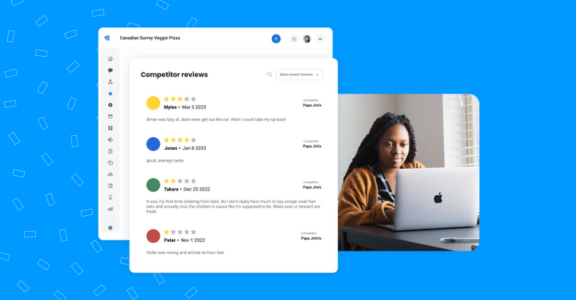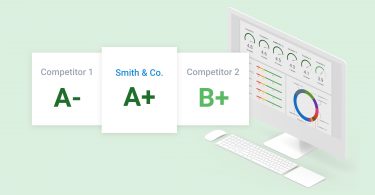Competitive intelligence is a game-changer for local businesses trying to attract new customers. While it may be a part of your marketing strategy, you might not be tapping into it as effectively as you can.
Diving deep into competitor and market intelligence can reshape your approach. It can help you discover what rivals are saying and offering customers, along with gaining insights into their operations.
In this blog, you’ll learn how to leverage competitive intelligence effectively keeping you one step ahead in your market.
Table of contents
Defining competitive intelligence
When it comes to business, competitive intelligence, or competitor intelligence, acts as a guiding light. It’s the practice of collecting and examining data about your industry, rivals, and products or services.
If you’ve ever wondered what differentiates a thriving business from one that barely survives, it’s usually because one has taken the time to gather market intelligence. Researching your marketplace is hands-down the best way to get valuable, secret-weapon knowledge that can give you a competitive edge.
Competitive intelligence isn’t limited to large corporations, either. It’s an invaluable tool for businesses of all sizes. Companies that have a grasp of their industry’s competitive landscape hold a significant advantage over those that neglect or disregard it.
Conducting competitive intelligence research isn’t just about keeping tabs on your rivals. It’s about discovering what your business is doing right and where it can improve. When competitive intelligence strategies are executed effectively, they enable you to identify gaps, craft better strategies, and develop a comprehensive understanding of your competition.
In essence, competitive intelligence is your radar — always on and always scanning the horizon for opportunities to grow and succeed.
“Birdeye has a simple interface that makes it easy to use. I love being able to monitor my competitor’s reviews. It provides good intel for our business.”
-Bruce Canales, Amica Mature Lifestyles Inc
Why is competitive intelligence important?
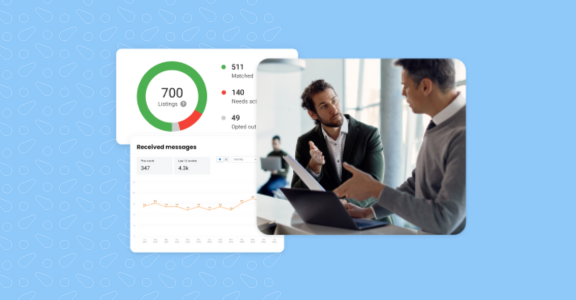
By using competitive intelligence effectively, you can gain real-world insights into your competitors and better understand the competitive environment. Let’s explore some applications of competitor intelligence to use to your advantage.
Informed decision-making
Armed with competitor data, businesses can use these insights to inform their decisions. It’s like having a bird’s eye view of the competitive landscape to help shape your strategies and empower your sales and marketing teams. Eliminate the guesswork in product development, discover new customer pain points, and reorganize pricing strategies by using competitive insights to guide you.
Identifying opportunities and threats
Competitive intelligence can also help highlight hidden market opportunities and looming threats to your bottom line. A rigorous competitor analysis sets the stage for your sales team to adopt innovative ideas, exploit new trends, and mitigate risks, empowering a more proactive approach to market changes.
Benchmarking performance
Businesses can assess their current market positions in terms of market share, product offerings, and overall performance by using competitive intelligence to benchmark their own performance. This essential understanding, lets you set tangible goals and track advancement over time.
With Birdeye’s competitive benchmarking feature, multi-location businesses can compare and analyze how their individual locations are performing against one another. Watch our free demo to see how it all works.

Enhancing product development
By closely analyzing the products and services of your competitors, you can look to identify areas of improvement and innovation within your own line of products or core service offerings.
Brands can carve out a distinctive competitive advantage, enhancing product development and delivering more compelling solutions than their rivals. Find out what your competitors aren’t doing and develop a unique value proposition.
Understanding customer preferences
Digging into competitors’ customer demographics and marketing strategies helps businesses grasp the factors influencing consumer preferences and loyalty. It’s your window into understanding who your rivals are targeting and how effective they are at doing so.
Using competitive intelligence tools like Birdeye Insights can help you gauge customer sentiment so that you can refine marketing campaigns and boost customer satisfaction.
Improving pricing strategies
Knowing how to price your offerings competitively is a big advantage. Too high, and you might lose market share. Too low, and you lose profit margins. With competitive analysis, you can gain insights into your competitor’s pricing data.
And when you know what your rivals are charging, your company can fine-tune its own pricing models. This allows you to stay competitive while still making a profit.
Protecting intellectual property
Observing your competitors closely helps protect your own assets. By keeping a vigilant eye on their actions, you can preempt potential challenges and take proactive measures to stay ahead of the game. This helps guard against costly intellectual property infringements and protect your company’s valuable assets.
Gathering competitive intelligence
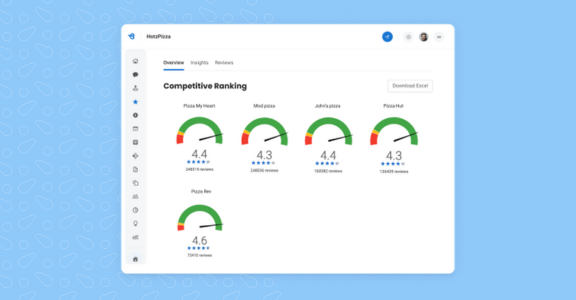
Multi-location businesses that are operating on tighter budgets might find competitive intelligence gathering a bit daunting. However, with the right approach, all businesses can get essential information in-house, and without breaking the budget.
Leverage market research tools, conduct online searches, create data-gathering techniques, and open dialogues with your customers and employees to unearth invaluable insights.
Company websites
Your competitors’ websites are data-rich sources of usable competitive intelligence. For example, study their product details and pricing structures to see what’s working and what’s not. Look for juicy tidbits in their company news, press releases, and blog posts to unlock actionable insights. It’s easy to use web info to turn their public presence into your private advantage.
Social media monitoring
Follow your rivals on platforms like Facebook, LinkedIn, and Instagram. Analyze their content, engagement strategies, and growth rates. This will give you an understanding of their marketing tactics and how they handle customer interactions, helping you to improve your own social media presence.

Online reviews
Look at customer feedback on Google and Amazon or industry-specific review sites like Avvo or Tripadvisor. Reviews offer unbias feedback on what competitors do well and where they drop the ball. This data could alert you to new trends or inform your strategies for online reputation management.
Industry reports and publications
Dive into industry reports and trade publications to stay up-to-date on your market. They’re treasure troves of emerging trends, regulator updates, and information about the big players in your sector.
Competitor financial statements
Financial statements of publicly traded companies are open books. They offer insights into the company’s financial health, growth rate, and overall performance.
Trade shows and conferences
Don’t dismiss industry events and trade shows. They’re perfect for getting an up-close look at competitors’ products, services, and marketing approaches. Plus, they offer chances to network with industry influencers and potential partners to grow your business.
Customer surveys and interviews
Consider using surveys or opinion-based interviews with your customers. Their feedback on competitor products and services can pinpoint areas for your differentiation and improvement. And they’ll often have a different vantage point on the market than you do.
With Birdeye Surveys, you can create, share, and analyze customer surveys via our easy-to-use platform without the hassle of traditional survey methods. Plus, you can improve customer experience and measure customer sentiment over time.
Mystery shopping
For a unique perspective, experience the competition firsthand by mystery shopping at their locations. Get the customer’s viewpoint on products and services, pricing, customer service, etc. You can also gain insights into operations that are unseen from the outside.
Using competitive intelligence
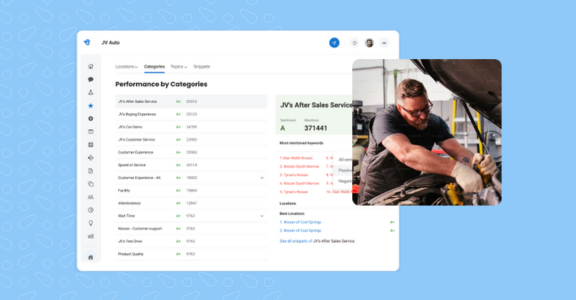
Let’s dive into how to apply your competitive intelligence. Below are some of the most beneficial aspects of incorporating this type of information into your business strategy.
Strategic planning
Harness competitive intelligence to guide your strategic plan. Whether you’re exploring market entry, developing products, or considering other partnerships or acquisitions, there’s intel to help you get ahead. The insights can spotlight market opportunities and threats. Empower your business, and turn intelligence into strategic actions.
Marketing and messaging
Check out your competitors’ marketing strategies and messaging to help fine-tune your own. You don’t want to be like them, but you can tailor your marketing campaigns to accentuate your unique selling propositions, ensuring they resonate with your target audience. Translate intelligence into a marketing advantage, amplifying your brand’s unique voice across every campaign and channel.
Sales tactics
Find and dissect your top competitors’ sales strategies to pinpoint best practices and close gaps. Empower your sales force with this knowledge, arming them with data-driven strategies and tools to outperform the competition. Competitor understanding transforms into sales capability, leading to an unrivaled edge in sales conversions within your market.
Customer experience
Examine your competitors’ customer journeys to spot opportunities that can benefit your opertation. Amplify your customer support, user experience, and post-sale service based on this data, boosting loyalty and satisfaction. Outpace them by creating an unrivaled experience that keeps your customers coming back for more.
Operational efficiency
Explore competitors’ ops, supply chains, and production methods to identify areas for improving efficiency and cost-cutting. Streamline your processes to increase productivity and reduce stress on resources.
Boosting brand reputation
Leverage your understanding of competitors’ strengths and shortcomings to distinguish your business and position your brand as a market leader. This strategic approach can enhance brand reputation, build trust, and fortify customer loyalty, giving your company the competitive edge it needs to thrive.
Risk management
Harness competitive intelligence to avoid potential risks, including new players in the market, shifts in regulations, or disruptive technologies. Having this foresight can help you be proactive, navigate complexities confidently, and keep business continuity even amidst an unpredictable industry landscape.
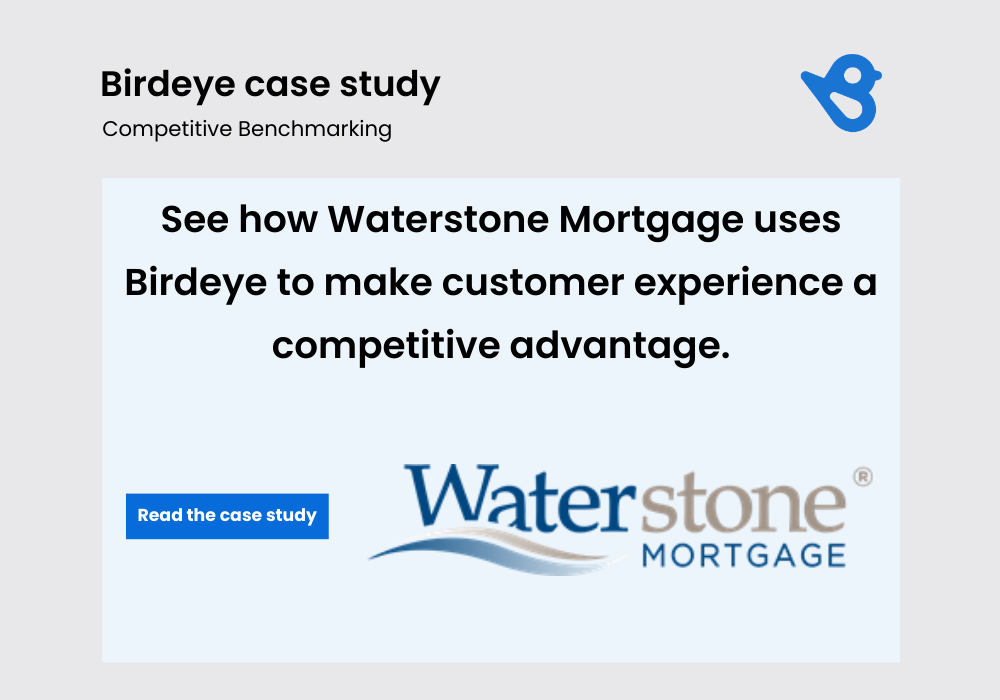
FAQs about competitive intelligence
An example of competitive intelligence can be a restaurant owner who monitors other restaurants’ social media for promotional ideas. That owner also examines online reviews for customer preferences, studies their menus, and surveys patrons for improved dining experiences.
Competitive intelligence is a methodical approach to acquiring, evaluating, and using information about competitors in order to enhance strategic decision-making. In essence, it’s the blueprint for gaining that extra edge in a competitive market.
Five ways to gather competitive intelligence are social media monitoring, examining online reviews, industry reports research, studying competitors’ strategies, and attending industry events.
Competitive intelligence via customer feedback
In the world of business, competitive intelligence is crucial. It’s the compass that helps you navigate even the most competitive markets. But let’s face it, turning constantly evolving streams of data into actionable insights is tough. Birdeye’s benchmarking software, leveraging advanced AI, is designed to tame this complexity. Click on the banner below to see how Birdeye helps large enterprises turn competitive intelligence into a competitive advantage.

Originally published
